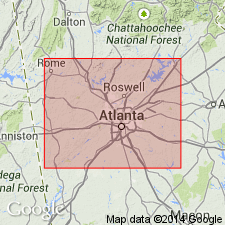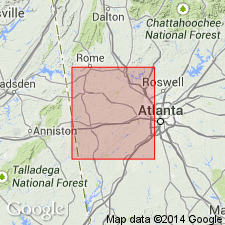
- Usage in publication:
-
- Kellogg Creek Mafic Complex
- Modifications:
-
- Named
- Dominant lithology:
-
- Amphibolite
- Gabbro
- AAPG geologic province:
-
- Piedmont-Blue Ridge province
Summary:
The informal Kellogg Creek metagabbro of McConnell and Costello (1980), is here named the Kellogg Creek Mafic Complex of the New Georgia Group in the Greater Atlanta Region, GA. It consists of garnet amphibolite, metagabbro, and minor meta-ultramafic rocks, with no direct evidence of extrusive facies. This premetamorphic complex is west of the outcrop area of the Laura Lake Mafic Complex. Age is Late Proterozoic and (or) early Paleozoic.
Source: GNU records (USGS DDS-6; Reston GNULEX).

- Usage in publication:
-
- Kellogg Creek Mafic Complex
- Modifications:
-
- Revised
- Age modified
Summary:
Kellogg Creek Mafic Complex completely encloses two separate units of the Acworth Gneiss. Though McConnell and Abrams (1984) interpreted the Kellogg Creek and the Acworth as the two oldest units of the New Georgia Group, in fault contact with the Univeter Formation, current investigation strongly suggests that the contact is conformable, making Kellogg Creek and Acworth much younger than previously thought. Sequence conformably overlies Canton Formation.
Source: GNU records (USGS DDS-6; Reston GNULEX).
For more information, please contact Nancy Stamm, Geologic Names Committee Secretary.
Asterisk (*) indicates published by U.S. Geological Survey authors.
"No current usage" (†) implies that a name has been abandoned or has fallen into disuse. Former usage and, if known, replacement name given in parentheses ( ).
Slash (/) indicates name conflicts with nomenclatural guidelines (CSN, 1933; ACSN, 1961, 1970; NACSN, 1983, 2005, 2021). May be explained within brackets ([ ]).

